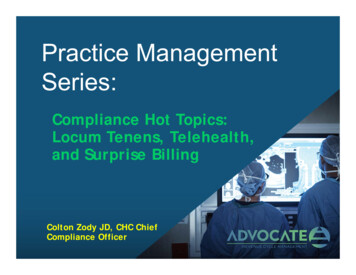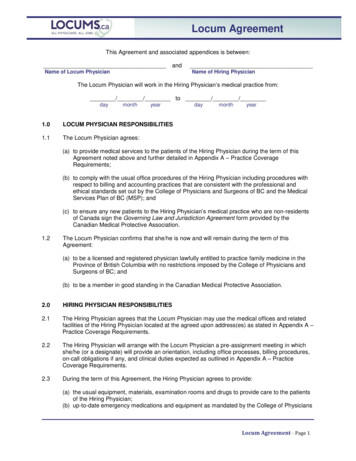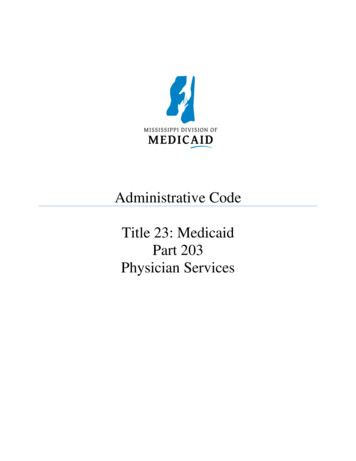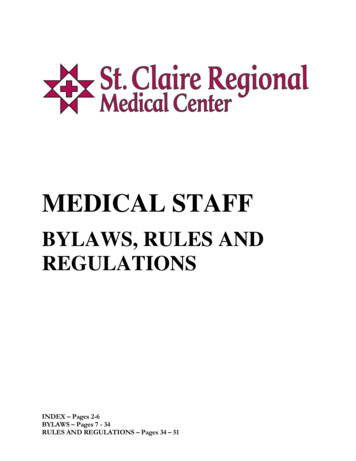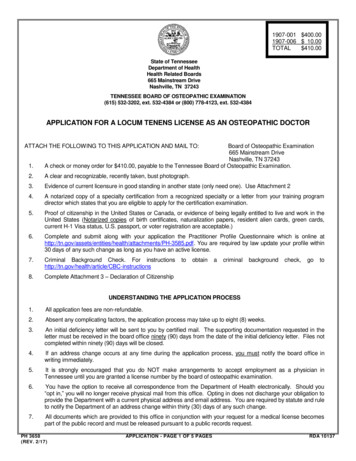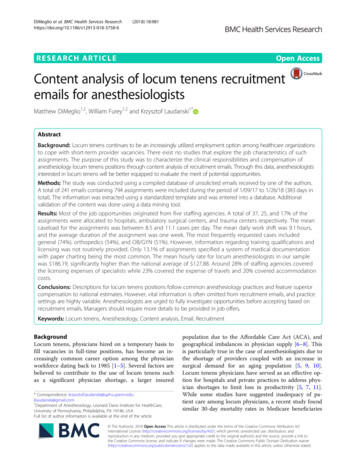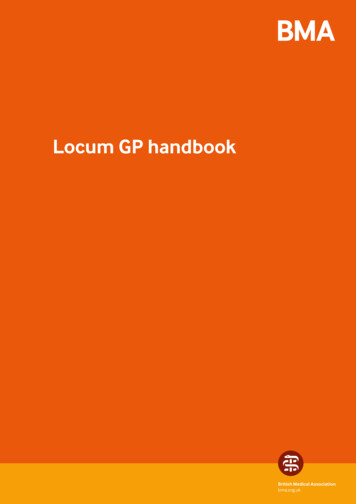
Transcription
Locum GP handbookBritish Medical Associationbma.org.uk
British Medical AssociationLocum GP handbookContentsAims of the handbook.3What is a locum GP and who engages locums?. 3Becoming a locum. 4Requirements for working as a locum GP. 5Ways of working as a locum. 7Locuming after GP training. 10Getting started as a locum and finding locum work.10Becoming an employer.12Confidentiality and the General Data Protection Regulation (GDPR).12Equipment.13Taxation and accounts.14Finding an accountant.15Negotiating fees.15Invoicing.17The NHS occupational pension scheme – general information.17Seniority pay.19Death in service benefits.19Insurance, maternity, adoption, parental and sick provisions.19Maternity Allowance.20Taking out insurance.20Modes of locum work. 22Working as a short term locum.22Working as a fixed term locum.22Professional considerations for locums. 26Reducing the risks of locum GP work. 32Working in an unfamiliar environment.32Agreeing terms of work.33Record keeping.33Dealing with complaints.34Prescribing and repeat prescribing.34Avoiding professional isolation and building networks. 37Problems with professional isolation.37Representation of locum GPs. 39National representation.39The BMA (British Medical Association).39BMA general practitioners committee.39Sessional GPs subcommittee of the GPC.39Local representation.39LMCs (Local Medical Committees).39BMA support to individual members.41For locums and providers. 42The contract for services.42Timetable of work.42Definition of work to be undertaken.42Additional and enhanced services.43Definition of contractor responsibilities.44Definition of locum responsibilities.44Termination of the contract for services (for self-employed locums).45Termination of employment (for employed doctors).461
2British Medical AssociationLocum GP handbookFor providers. 47Reimbursement available to practices for locums.47Recruiting locums.47Provider responsibilities.48Locum GP induction.50The induction drill.50The induction pack.51Working through platforms and locum banks. 52Sources of further information. 54Appendix 1 - Employment status – Key factors. 55Appendix 2 – Template GP locum induction pack for practices. 56Appendix 3 – Legal structures. 62Partnerships.62Limited liability partnerships (LLPs).65Private companies limited by shares.66
British Medical AssociationLocum GP handbookAims of the handbookThe BMA Locum GP handbook has been produced as one of the many benefits available toBMA members, providing advice and guidance on all aspects of GP locum work. It should beuseful for:– locum GPs– those intending or about to become locum GPs– practices and other providers who engage the services of locum GPs.This handbook is relevant to all four UK countries. Where there are national variations inpolicy and practice, these are noted.What is a locum GP and who engages locums?What is a locum GP?A locum GP is defined as one who temporarily takes the place of another GP. Locums areusually self-employed and are sometimes also referred to as freelance GPs.A self-employed locum GP has a contract for services rather than a ‘contract of service’,which would be the case for a salaried GP. Locum GPs can operate in many different waysincluding as sole traders, by joining a locum agencies or a web-based platform, as part offormal partnerships or other group arrangements (eg ‘chambers’). Locum GPs are usually*self-employed and paid fees for their work. Being self-employed they would not expect toreceive the same benefits as permanent contracted GPs (eg holiday pay, sick pay, maternity/paternity pay) but this should be factored in when determining locum fees. As with otherself-employed workers, they will not have income protection, unless they take out their ownpersonal insurance.The way that locum GPs undertake their work varies widely:– some provide cover for a specified fixed-term period (eg to cover for maternity leave)– some provide services to practices on an ad-hoc basis– some provide a range of services– some provide specific services.Working as a GP locum has become more popular as a specific career choice to support aportfolio career and to provide a better work-life balance, rather than traditionally beingused to remain practicing while between more substantive posts (when new to an area, postretirement etc).Practices commonly engage self-employed locums to cover long-term absence owing tosick leave, maternity leave or sabbaticals. In these cases the locum may be offered fixed termemployment. Increasingly locums are also used to cover sessions while practice based GPswork outside the practice. GPs with specific skills such as minor surgery can be contractedby practices to work in that particular field.Who engages locums?Locum agreements can be made between locum GPs and a variety of different parties: GMS,PMS, APMS practices, private/non-NHS practices, and out of hours providers.Determining your employment statusEmployed and self-employed GPs are normally distinct in terms of their contractualarrangements and responsibilities and rights in relation to their employers and contractualproviders. It is vital for locum GPs and practices to give serious consideration to this, as thedistinction can become blurred between a locum GP and a salaried GP when a locum is in apractice on a long-term basis or when a locum is working through an agency.* But see ‘determing your employment status’ for exceptions3
4British Medical AssociationLocum GP handbookFor tax and national insurance contribution purposes, there is no statutory definition of acontract of service (employment) or of a contract for services (self-employment). Case lawrelating to tax and employment status provides a number of key characteristics which canassist to determine an individual’s employment status as employed or self-employed, asneither the length of a particular engagement nor the presence or absence of a contractof service can determine employment status on their own. Some of the characteristics tobe considered can be found in appendix 1. It is important to note that employment status isnot a matter of personal preference, or how the relationship is referred to by the locum andthe provider, but depends upon what actually happens in practice. As no single factor alonecan determine an individual’s employment status, a holistic overview of the engagement isrequired to determine your status. It is also worth noting that an individual’s employmentstatus can change over time as the relationship progresses and changes.For a general guide as to whether your work is likely to be regarded as employment or selfemployment, see the HMRC’s guidance and Employment Status Indicator.A locum’s employment status has wide ranging implications financially (taxation, nationalinsurance and pensions), contractually and legally. For employees, their employer wouldbe expected to calculate their pension and National Insurance contributions and to beresponsible for remitting the employee’s income tax payments to HMRC under PAYE.Employees would also have their salary, leave and sickness entitlement, etc. detailed in theircontract. Self-employed locums, on the other hand, are responsible for accounting to HMRCfor their own tax and NIC liability. However, changes to the intermediaries legislation meansthat locums working through personal service companies (PSC), in certain circumstancesare not liable, please see further guidance here.Practices and locums must ensure that any long-term or regular work undertaken isproperly treated as either self-employed or employed work. Both parties are advised totake advice on this matter from the BMA and accountants.It is perfectly possible for an individual to do locum work under separate contracts in both anemployed and self-employed capacity at the same time. An example would be working for apractice as a salaried GP part of the week and being a locum for the remainder of the time.Becoming a locumIs locum work for you?GPs take on locum work for a wide variety of reasons. Sometimes locum work is activelychosen as part of a portfolio career (where a GP takes on a number of different types of jobeg medical politics, medical journalism, research or teaching etc) and/or to work aroundfamily commitments. Some newly ‘retired’ GPs choose to do locum work to keep up somemedical practice. Locuming can also be a good way to try out different types of workingenvironments before committing to a salaried or partnership post.For other GPs, locum work is taken on as an interim measure while actively looking forlonger-term positions. In any case, the unique characteristics of working freelance as alocum presents both advantages and disadvantages.
British Medical AssociationLocum GP handbookAdvantages of locum work– a potentially high degree of autonomyover working hours and place of work– a chance to work in a variety of differentenvironments– work can be taken on around otherprofessional and/or family commitments– you can choose to take breaks fromworking, for example to travel or pursueother projects– working commitments are more rigidlydefined and do not involve the managerialconcerns that partners have– locuming is one way to make your nameknown locally and may put you in astronger position when more permanentor alternative leadership posts becomeavailable– by negotiating pay, dealing with invoicingand sorting out taxes locums learn smallbusiness skills useful in running a practiceor working in commissioning– you should not need to negotiate withcolleagues if you want time off at busyperiods such as Christmas– you may find that it is easier to move toanother area to work and live than it wouldbe as a partnerDisadvantages of locum work– l ocums can become or feel isolated fromother doctors (see Avoiding professionalisolation)– locum GPs are sometimes excluded fromformal and informal information cascadesand locality networking– CPD and appraisal opportunities needdifferent consideration in locum work (seeProfessional considerations for locums)– it can be harder to keep up to date withcertain aspects of practice eg chronicdisease management, baby clinics,updating computer skills– you need to adjust to different workplaces quickly, and you will need to ensurea good induction where you work– you may have to work with a lot ofdifferent computer systems and you willneed to ensure that you have an individuallog-in in each place of work.– locuming can carry potential risks owingto poor induction, not being familiar withthe patients, fewer chances for handoverand case discussion (see Reducing therisks of locum work)– you can miss out on patient continuity inshort term jobs– locums must normally organise their owninvoicing, accounts and pensions, unlessworking for an agency or employing anaccountant to do this for them– uncertainty of income – if opportunitiesare in short supply locally you may faceperiods without work or long journeys tojobs– locuming can involve working at antisocialtimes such as bank holidays, Christmasetc when locum work is more readilyavailable– no employee benefits eg sickness,maternity, study or annual leave, unlessworking for an agencyRequirements for working as a locum GPLocum GPs are fully qualified GPs and therefore have the same training and qualificationsas the medical providers for whom they provide services. Locums must be included on theGMC’s GP Register. To work as a GP, the locum’s name must also be on the Performers List inthe country in which he/she wishes to work.As for other self-employed workers, the European Working Time Directive Regulations donot apply to locum GPs.5
6British Medical AssociationLocum GP handbookGMC GP RegisterCheck that you are included on the GMC’s GP Register by contacting the GMC directly orvisiting www.gmc-uk.org/doctors/register/LRMP.asp. If your name is not already includedthen you should apply for this. It is a free of charge service.GMC licence to practiseIn 2009, the GMC introduced the licence to practise. All doctors registered with the GMCwere asked to confirm that they wished to be licensed. Those who responded positivelyreceived written confirmation from the GMC; the GMC is not issuing a licence certificate. Thelicence will need to be renewed, and this will be on a five-yearly basis following revalidation.Performers ListLocum GPs must apply to be on the national Performers List of England, Wales or NorthernIreland. In Scotland, rather than a national performers list, each Health Board operate theirown list. However, since June 2016, GPs in Scotland applying to the performers list can, witha single application, elect to be included on every Health Board list. You can be on more thanone national list in the UK at a time, which can be useful if you are working on a border. Youcannot practice in a country if you are not registered on the relevant list.You are encouraged to apply well in advance of the start date of your work. Applying for thePerformers List can be time consuming. This is particularly so as you will need a disclosureand barring service (DBS) check or equivalent (except that in Scotland the need for this is notobligatory). There is no set time, but generally if you have had a DBS check in last three years,then this should be accepted, however it is still best to check.To join a Performers List in order to become a locum GP, an application must be made to therelevant national body. Further information and application forms can be found below.– England http://pcse.england.nhs.uk/performer-list/, policy and procedures https://www.england.nhs.uk/joint/– Wales – Scotland � Northern Ireland You can appeal if your application is refused or if you are subsequently placed underconditions, unless a mandatory refusal applies (eg if you have been convicted of a seriouscrime). For further details about appealing, please contact the BMA for individual advice.Once you are on a Performers List, there are certain criteria with which you are required tocomply, including:– work in that area on at least one occasion during a 12-month period (see below)– undertake an annual NHS appraisal– inform NHS England or the Health Board of any change of contact address– inform NHS England or the Health Board of any material changes to the informationprovided in the application– cooperate with an assessment by the National Clinical Assessment Service (NCAS) whenrequested to do so– supply a DBS certificate or equivalent if requested with reasonable cause.Failure to meet these requirements could result in you being removed from the list andtherefore ineligible to work as a GP (unless re-included or subsequently included onanother list).
British Medical AssociationLocum GP handbookPerformers List requirements: minimum requirementsIt is a requirement of remaining on a Performers List that a GP must undertake someNHS GP work in the area during a 12-month period. The BMAs interpretation of theregulations is that provided the GP undertakes some work (even just one session perannum), then they should not be removed from the list.If it is suggested that you will be removed from a list due to insufficient GP work beingundertaken, contact the BMA as a matter of urgency. The BMA can assist in helping toresolve this.Undertaking a very limited amount of work can be detrimental if it prevents youkeeping fully up to date and maintaining your skills. This could also have an adverseimpact on your appraisal and revalidation, while appraisal is based on the scope of yourwork, being unable to maintain skills could have an adverse impact on revalidation.It is unlawful to discriminate or penalise GPs who take breaks from work formaternity leave, even where this means failing to attain the minimal annual workingrequirements.You should inform NHS England or the Health Board of any upcoming maternity leaveand discuss with the RO or appraisal lead any deferment or other arrangement requiredregarding your appraisal while on maternity leave.Ways of working as a locumThere are different ways of setting yourself up for work as a locum. For example, you canchoose to operate as a sole trader (self-employed), or as part of a ‘chambers’ or you can joinan agency. If you are working as a self-employed GP, your agreement with practices will be a‘contract for services’, rather than a ‘contract of service’, which would be the case if you werean employee.Locums should consider taking separate legal advice about the various options available.Working as a sole traderThe intention of a sole trader is to work in a self-employed capacity, which involves moreadministration but also more independence than employment through an agency. However,beware that an intention to operate in a self-employed way is not sufficient to guarantee thatyour work will be viewed in this way.Some locums choose to set up a partnership framework to organise their work. This canbe an appealing option for locums who want to work with family members, perhaps using aspouse for administrative management.Working for a locum agencySome GPs find locum work through agencies, though this is less common than for hospitalbased locum work. If you choose to work through an agency, the agency (or agencies) youare registered with will contact you with work that meets your specifications. If you areinterested in the job they will put you in touch with the provider. While you are working youwould then normally provide details of the hours worked to the agency which will pay youand charge the provider for the hours worked plus a fee or commission for itself.You should be aware that if you are supplied through an agency, you may be viewed as beingemployed by the agency, rather than self-employed. In this case, the agency would haveto operate PAYE and account for Class 1 National Insurance Contributions. Agency pay isnot pensionable under the NHS pension scheme because you are regarded as working forthe agency and not for the NHS. You need to be aware of IR35 when working for an agency,please see our guidance here.7
8British Medical AssociationLocum GP handbookJoining a web based platformsWeb-based platforms are becoming more prevalent among locums. A doctor can join up toone of these websites for a fee and they will be connected with employers. They ‘connect’a locum with an employer, so the doctor is not considered to be employed through thisplatform, and therefore the locum is still considered to be working for the NHS throughthis ‘connector’. This has the advantage that the work will remain pensionable in the NHSscheme.Joining ‘chambers’Some locums form a ‘chambers’ in order to share administrative costs while maintainingmore autonomy than an agency affords. There are a number of GP locum chambers alreadyestablished across the UK and the BMA has produced specific guidance about setting up orjoining a chambers, please follow this link for further information.Pros and cons of different ways of workingWorking as asole traderProsConsOtherconsiderationsMost straight-forwardapproach to selfemployed locumingYou will carry theadministrativeburden aloneIf you employ anystaff to help you,you must ensureyou comply withemployment lawProvides maximumindependenceBe certain that anywork you undertakeis correctlydesignated andtreated as selfemployment, ratherthan employmentWorking for alocum agencyWill help find workCan considerably reducethe administrationinvolved in locum workMay limit yourfreedom to contactpractices yourself inthe futureYou could probablybe considered anemployee of theagency.Agency pay is notpensionable underthe NHS pensionschemeYou will not be ableto offset so manyexpenses againstyour tax bill.Establishing apartnershipAllows you to workwith other locums orwith family membersin a relatively straightforward legal structure.Could work better fortax purposes in somecircumstancesMore complicatedlegally andfinancially thanbeing a sole traderSee Appendix 3 –Legal structures
British Medical AssociationJoiningchambersLocum GP handbookMay reduce some of therisks involved in settingout aloneWill probably provideeconomies of scale foradmin/accounting etcIf operating under a legalstructure which makesthe chambers a singleorganisation, couldincrease your bargainingpower vis a vis providers.Cons depend on thearrangements andlegal structure inplace.Will probablylose someindependence.You will probablyhave to paythe chamberssomething or theywill subtract aproportion of yourfee.Setting up chamberscan be timeconsuming.9Particularlyimportant to ensurethat you do notbreach Competitionlaw. See Appendix 3.
10British Medical AssociationLocum GP handbookLocuming after GP trainingFor many newly qualified GPs, locum work will be the first job taken after qualifying.Locuming after GP training can provide a good opportunity to experience different types ofpractice. A locum can get experience working in different areas (eg inner cities and suburbia,rural or remote, large corporate practices or very small practices). Locum work might alsoencompass expedition medicine, ship doctoring or posts abroad. By undertaking a varietyof jobs, newly qualified GPs can build experience and hone their preferences. Locuming in anew region or town is also one way to find out which practices would be desirable for morepermanent posts.If you want to start locuming after GP training, you are advised to prepare early (see ‘Gettingstarted as a locum’ as below). Most well organised practices and agencies will book theircover well in advance so start networking early, perhaps three months ahead. Do as muchpaperwork as possible while you are still training. Networking during training, for example byattending local meetings, can also help to secure appointments.Consider starting work in the area you know. Too many changes at once might be dauntingso consider checking with local practices or even your current practice whether they needany cover. Practices are more likely to take on doctors they know. In the case of an unfamiliarpractice, you might want to ask other doctors what they know about it before committing towork there. You should also join a local sessional GP group as this is a good way to maintaincontacts and assist with finding work.Getting started as a locum and finding locum workStarting out as a locum can be daunting. This table provides some tips on starting out andfinding work.Getting startedDecide in which area(s) you want to workThis will probably be an area where you have previously worked or where you trained.It is helpful to understand the needs of the population and the local health economy. Aworking knowledge of computer systems used locally is also an advantage.Consider how you want your career to develop and what you want to gain from yourlocuming positions so you can plan accordingly.This will help to determine whether you apply for short or long term positions and howyou define your role. An advantage of being a locum is the increased opportunity todecide how work is balanced against other interests and personal commitments.Ensure you are on the Performers ListAll practicing GPs must be on a Performer’s List in the country in which they work. Ideallythis should be in the area where most of their work is done. The Performers List is alsoimportant for helping to organise appraisals.Make contact and develop a good relationship with the local area team/Health Board.Ensure you find out how to access the appraisal system and appraisal policy. It is alsoadvisable to be on the relevant CCG and LMC mailing list.Prepare a business card, your standard terms of engagement, a CV and possibly a websiteThink about the minimum amount you require to charge to cover your professionalexpenses.
British Medical AssociationLocum GP handbookIt is a requirement that you hold full MDO indemnity that covers all types of work thatyou undertake and that you keep your indemnity provider informed of any changes toyour work, sessions worked per week a
For a general guide as to whether your work is likely to be regarded as employment or self-employment, see the HMRC's guidance and Employment Status Indicator. A locum's employment status has wide ranging implications financially (taxation, national insurance and pensions), contractually and legally. For employees, their employer would be expected to calculate their pension and National .
